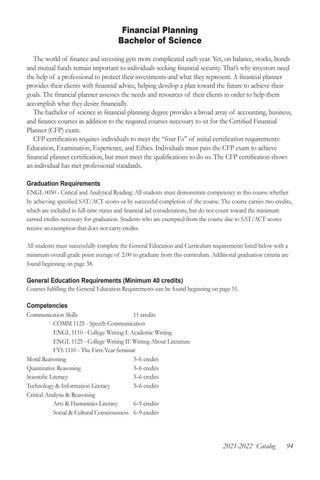Financial Planning Bachelor of Science The world of finance and investing gets more complicated each year. Yet, on balance, stocks, bonds and mutual funds remain important to individuals seeking financial security. That’s why investors need the help of a professional to protect their investments-and what they represent. A financial planner provides their clients with financial advice, helping develop a plan toward the future to achieve their goals. The financial planner assesses the needs and resources of their clients in order to help them accomplish what they desire financially. The bachelor of science in financial planning degree provides a broad array of accounting, business, and finance courses in addition to the required courses necessary to sit for the Certified Financial Planner (CFP) exam. CFP certification requires individuals to meet the “four Es” of initial certification requirements: Education, Examination, Experience, and Ethics. Individuals must pass the CFP exam to achieve financial planner certification, but must meet the qualifications to do so. The CFP certification shows an individual has met professional standards. Graduation Requirements ENGL 0050 - Critical and Analytical Reading: All students must demonstrate competency in this course whether by achieving specified SAT/ACT scores or by successful completion of the course. The course carries two credits, which are included in full-time status and financial aid considerations, but do not count toward the minimum earned credits necessary for graduation. Students who are exempted from the course due to SAT/ACT scores receive an exemption that does not carry credits. All students must successfully complete the General Education and Curriculum requirements listed below with a minimum overall grade point average of 2.00 to graduate from this curriculum. Additional graduation criteria are found beginning on page 38. General Education Requirements (Minimum 40 credits) Courses fulfilling the General Education Requirements can be found beginning on page 51. Competencies Communication Skills 11 credits COMM 1125 - Speech Communication ENGL 1110 - College Writing I: Academic Writing ENGL 1125 - College Writing II: Writing About Literature FYS 1110 - The First-Year Seminar Moral Reasoning 3–6 credits Quantitative Reasoning 3–6 credits Scientific Literacy 3–6 credits Technology & Information Literacy 3–6 credits Critical Analysis & Reasoning Arts & Humanities Literacy 6–9 credits Social & Cultural Consciousness 6–9 credits
2021-2022 Catalog
94

